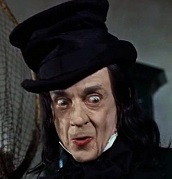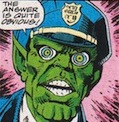|
Fergus Mac Roich posted:Can anyone explain to me, a historical ignoramus, what the situation was with slavery in the early days of British colonization of America? More precisely, I want to know when and specifically how it became a matter of race. I'm aware of a certain Anthony Johnson, whom I vaguely remember from history class. He was an African, born and raised, who was kidnapped and turned into an indentured servant in the American colonies. He had a pretty interesting life overall, but the thing that really interests me is that he wasn't a slave for life, and in fact, eventually became a land owner himself, and held several slaves(or servants, not sure which). Does this imply that he, as a black man, was really no better or worse in the eyes of his captors than the white Europeans who were locked in indentured servitude at the time? Or did he just get lucky? I've also heard that it was apparently considered to be illegal to keep a Christian man as a slave for life, but I don't know if that's accurate whatsoever. One good essay that explains the history of all this is Barbara Fields' "Slavery, Race and Ideology in the United States of America". The basic premise was that Europeans used the mental model of feudalism with hereditary benefits depending on the status of your parents, originally this was their "right" by force of arms, but later the rationalization came about due to ones "blood": nobles were good/rich/powerful/aristocrats because they fell out of the correct vagina. This idea ended up becoming our nation's idea of "race" - that some people were inherently worthy or unworthy of rights based on their bloodline. Many states adopted a "one drop rule" to embed this in their laws: if you had one drop of negro blood in you, then you were a negro. There wasn't any other way to rationalize slavery in a nation that believed it was founded upon the basis of liberty and freedom except by claiming that those intentionally left out were defective by nature, that their bloodlines were tainted and inherently defective.
|
|
|
|

|
| # ? Jun 11, 2024 17:45 |
|
Pearl Harbor and the Coming of the Pacific War is a really good book about the lead up to Japan attacking Pearl Harbor. It's mostly primary source documents from both sides detailing the various negotiations throughout 1940 and 41. There's some neat stuff in there, like the extremely long-winded notice that Japan was breaking off negotiations that US translators received on December 7. It only explicitly stated that Japan was ending negotiations after like 14 pages, and the translators though, oh poo poo, we need to get this to the White House ASAP. The US had stopped trading oil and scrap metal to Japan, and this had a huge effect on the war machine. The US was demanding that Japan pull out of southeast Asia, and later Manchuria, in exchange for reopening trade. Japan thought that they could pull some oil out of Vietnam, but that might provoke war with the US because of their relationship with the French. Basically, Japan wanted three things: oil, peace with the US, and expansion, and it could only ever have two of those. Pearl Harbor was basically a last-ditch effort to cripple the US Navy to such an extent that Japan would have free run of the Pacific for a couple years. Yamamoto predicted pretty accurately that they would have a year at most. One of the more entertaining activities in my school career was a reenactment of the US-Japan negotiations, in which both sides were unwilling to give up basically anything and war happened anyway.
|
|
|
|
cheerfullydrab posted:You honestly believe there was a good side in WW2, and that the USA was part of it?? Trying to keep this on the American history track. If only the Allies would have been high-minded enough to choose pacifism while Hitler exterminated the Jews, gays, and gypsies and Japan raped
|
|
|
|
cheerfullydrab posted:You honestly believe there was a good side in WW2, and that the USA was part of it?? Trying to keep this on the American history track. Not everything has to be black and white, disney-esqe good vs. evil. There can be a "good side" in a war even where that good side commits unthinkable atrocities. The bombing of dresden was a godawful war crime, but genocide of Europeans on a massive industrial scale was even worse. Just as the Union was the "good side" in a war that saw them burn down wide swaths of the South in order to ultimately end slavery.
|
|
|
|
Miltank posted:If only the Allies would have been high-minded enough to choose pacifism while Hitler exterminated the Jews, gays, and gypsies and Japan raped
|
|
|
|
SpRahl posted:Another fun fact is that the military was considering the strategic use of atomic bombs in support of an invasion and were told that the GIs only need to avoid impacted areas for 48 hours so it probably would have been real messy. Little discussed fact. On the day scheduled for the invasion that never happened, there was a massive typhoon that hit the staging grounds. Damage was EXTENSIVE. If there had been a full force, it would have basically been an unmitigated disaster. Truman also loved to talk about the invasion that never happened. Inflating the numbers over and over and over again with each retelling. And of course, no one bothers to mention the impact that the Soviet invasion had. Japan was holding out, expecting the soviets to stay out of it, hoping that they would be the one to negotiate a peace with. Once that dream shattered, it was all over and the Soviets had swept them off the mainland and were starting to take islands. It had not been all that long since Japan humiliated Russia, and unlike the US, the Russians were playing for keeps.
|
|
|
|
Pro-PRC Laowai posted:Little discussed fact. On the day scheduled for the invasion that never happened, there was a massive typhoon that hit the staging grounds. Damage was EXTENSIVE. If there had been a full force, it would have basically been an unmitigated disaster. I honestly wonder if that was a coping mechanism - strategic bombing equivalence aside, Truman issued the order to drop the atomic bombs. Like anyone in war except the absolutely soulless, you rationalize your actions as a sort of personal debrief to remind yourself you aren't a murderer at heart. Either him or me, protected my buddies, for king/god/country, etc. For Truman (and a lot of people involved with it I imagine) the rationale was the prevention of a larger bloodbath on the balance of things. It's certainly got the benefit of a lot of factual evidence, which makes it a little easier.
|
|
|
|
Pro-PRC Laowai posted:Little discussed fact. On the day scheduled for the invasion that never happened, there was a massive typhoon that hit the staging grounds. Damage was EXTENSIVE. If there had been a full force, it would have basically been an unmitigated disaster. Yeah except the Soviets had no real way of getting their giant army from mainland Asia to Japan.
|
|
|
|
Dr. Tough posted:Yeah except the Soviets had no real way of getting their giant army from mainland Asia to Japan. Except the Russians' were not completely inexperienced with naval landings and had plans to invade the home island of Hokkaido. Granted it would be impossible for the soviets to actually conquer all of Hokkaido in such a short time frame, but having a soviet beach head would allow Stalin accept the surrender of Japanese forces on the island, granting the USSR de facto control of it. However with the dropping of the bombs, Stalin decided that having only one home island wasn't worth it and cancelled the invasion after waffling on it for a few days. fake edit: that link is to the russian wikipedia so you'll need to translate it or use chrome.
|
|
|
|
Dr. Tough posted:Yeah except the Soviets had no real way of getting their giant army from mainland Asia to Japan. The Soviets didn't have a huge navy in the Pacific circa World War 2, but you just needed a handful of troops on the mainland to dramatically change the post-war dynamic. That's sort of what happened in Korea.
|
|
|
|
Dr. Tough posted:Yeah except the Soviets had no real way of getting their giant army from mainland Asia to Japan. The Japanese quaking in their boots over the Soviet invasion had less to do with a Soviet amphibious assault on the Home Islands and more to do with losing the last possible mediator in a negotiated peace and losing an area roughly the size of Western Europe that the Japanese were hoping to retain in said negotiated peace (and losing such real estate in mere weeks, at that)
|
|
|
|
Emanuel Collective posted:The Soviets didn't have a huge navy in the Pacific circa World War 2, but you just needed a handful of troops on the mainland to dramatically change the post-war dynamic. That's sort of what happened in Korea. You do need a decent navy though to keep your beachhead from being destroyed.
|
|
|
|
BrotherAdso posted:This is a really interesting story. I'd love a source on it -- all I can find is an article from a few years ago in The Journal Of American-East Asian Relations with a cursory search. The source for it is a few pages in The Longest Mission where they talk about this. It's glossed over and someone years ago told me this and I looked it up, but it's there, and it's one of those funny stories in history. Another one of the funny stories and one that's actually very famous is the prediction Yamamoto made immediately after Pearl Harbor, "I shall run wild considerably for the first six months or a year, but I have utterly no confidence for the second and third years." The battle of Midway ended exactly 6 months to the day after Pearl Harbor and is considered to be the point when Japan lost the war. A Winner is Jew fucked around with this message at 20:33 on Nov 4, 2013 |
|
|
|
Amused to Death posted:You do need a decent navy though to keep your beachhead from being destroyed. Normally yes. But the Japanese were completely taken by surprise by the Soviet's declaration of war (both sides had been firmly committed to neutrality after Khalkhin Gol) and the Japanese were preparing for an American invasion in the south and east of the home islands. There were practically no real defenses in the north and west. In addition, the Japanese Navy had been ripped to shreds in the Pacific campaign and couldn't have defended all sides of the home islands. Nobody seriously claims that the Soviets could have taken the Islands, but they could have realistically carved out a nice little occupation zone. Note that the Soviets basically ran forces into Korea as fast as they could with no means to supply any of them, because the very fact that they had troops in some areas of the country guaranteed they'd have tons of leverage over the area. It worked out tremendously for the Soviets. So if Stalin had landed a few thousand troops in Northern Japan and then lost the ability to reinforce or supply any of them, it's still a net win for the Soviets assuming Japan surrenders at some point. Emanuel Collective fucked around with this message at 20:30 on Nov 4, 2013 |
|
|
|
Pro-PRC Laowai posted:Little discussed fact. On the day scheduled for the invasion that never happened, there was a massive typhoon that hit the staging grounds. Damage was EXTENSIVE. If there had been a full force, it would have basically been an unmitigated disaster. It's kinda funny that had a naval invasion of Japan gone ahead, it would have been hampered by another Kamikaze.
|
|
|
|
tooterfish posted:The allies were better, but lets not let that high horse get too high. Speaking of the rapes of French women, the attitude of so many US soldiers in France was so anti-Friench that the US Army produced a pamphlet answering the most common Francophobe complaints. Some choice excerpts: 112 Gripes About the French posted:55. "French women are easy pick-ups."
|
|
|
|
Orange_Lazarus posted:So did we really have to drop the bombs on Hiroshima/Nagasaki to end the war and achieve the same results? For some reason in history class I just kept thinking "Couldn't we have dropped it on a military base or somewhere deserted just to show how destructive it was?" The Japanese believed that Americans were "weak" and that they could force the Allies to the bargaining table by making the conquest too bloody. This lead to the mass suicides in Saipan, the human waves in Okinawa and the Kamikaze attacks. During the capture of Okinawa, about 50 Japanese died to kill each Allied soldier. This ratio was expected to continue when taking the main islands and it was expected that there would be 500,000 to 1,500,000 Allied casualties to fully capture and subdue the Japanese. They made so many Purple Heart medals in anticipation of that invasion that they haven't had to make any new ones since 1945. The implication should be obvious that both the Allied and Japanese commands expected a minimum of 20,000,000 Japanese civilians to be killed in any conventional invasion of Kyushu and Honshu. According to Cook in Japan at War there were 4,335,500 Japanese soldiers at the time of the surrender with about 3,500,000 stationed outside the "home islands". According to Rhodes in The Making of the Atomic Bomb and Dark Sun, the Japanese authorities knew exactly what happened in Hiroshima as they had 2 atomic bomb projects of their own (one in Tokyo and the other in what we now call North Korea). Their rationalization was that since it took 4 years to make the first atom bomb, it would take 4 more years to make the next atom bomb. We knew they thought this because we were reading their codes. The Korean facilities were around Chosin Reservoir, and that had a reputation for being some of the fiercest fighting during the Korean war. I suspect that most of the stuff had already been dismantled and moved to the Soviet Union. And I suspect it was some combination of Norsk Hydro and Hanford. Hiroshima was the central command headquarters for Kyushu (the southern island that has Nagasaki) and had about 50,000 troops stationed there. Nagasaki's port was going to be essential for supplying an amphibious invasion, so that port had to be taken. Nagasaki was the secondary target for the 2nd bomb, and a place called Kokura Arsenal was the intended primary target. Kokura was an industrial city that made a lot of weapons. If there was some sort of staged demonstration explosion, how would the Japanese believe that it was a single bomb and not some trick like pulling a rabbit out of a hat? In retrospect, we know that they had spies in Los Alamos, everybody did. They knew it was real. In "Dark Sun" there were some reports of a massive explosion in Korea that roughly matched what was originally called the "100 ton test" in Los Alamos. You only do that when you are close to making your own first atom bomb. Were they close? We'll never know. All that stuff is hidden behind lies, classification and cultural mythology. As an example, the U-234 incident (where the sub was hauling half a ton of Uranium to Japan) was covered up for decades. We wanted the Japanese on our side for the Cold War, so we willingly covered up lots of war crimes. The Chinese people still uncover WW2-era Japanese biological weapons from time to time.
|
|
|
|
VitalSigns posted:Speaking of the rapes of French women, the attitude of so many US soldiers in France was so anti-Friench that the US Army produced a pamphlet answering the most common Francophobe complaints. Holy crap that whole thing is one huge 
|
|
|
|
Farecoal posted:Holy crap that whole thing is one huge I especially love the answer to complaints about how much French prostitutes charge. "Hm, maybe you should blame your fellow horny GI johns for outbidding you rather than the girls?"
|
|
|
|
Emanuel Collective posted:Not everything has to be black and white, disney-esqe good vs. evil. There can be a "good side" in a war even where that good side commits unthinkable atrocities. The bombing of dresden was a godawful war crime, but genocide of Europeans on a massive industrial scale was even worse. Just as the Union was the "good side" in a war that saw them burn down wide swaths of the South in order to ultimately end slavery. Miltank posted:If only the Allies would have been high-minded enough to choose pacifism while Hitler exterminated the Jews, gays, and gypsies and Japan raped Teriyaki Hairpiece fucked around with this message at 23:37 on Nov 4, 2013 |
|
|
|
cheerfullydrab posted:The morality of the war is just one of several endless, endless and lovely WW2 arguments that have gone on for years and will continue to go on. It's really just about personal convictions when you get down to it. No, I don't think there was a "good side" in WW2 or that the USA were the "good guys" or right in what they did. Also I don't deny any Axis atrocities or see the world in black and white. You claim to see the world in shades of grey, but you are depicting it as universally black. You say that you don't think the Allies were right in what they did. What would have been right? Fighting only a defensive war, leaving continental Europe to the literal, original, genocidal fascists? Let the Japanese destruction of China, which lost nearly half as many lives as every other nation except Russia put together, and forceful colonization of Korea continue unabated? The Allies committed many atrocities, absolutely, but they were not the worse side, or even the equals to the Axis nations. Ideally, war wouldn't happen. But it did. So what would have been right for the Allies to do? Unreal_One fucked around with this message at 23:56 on Nov 4, 2013 |
|
|
|
When did American opinion turn so decisively against France? Was there any lasting gratitude to France for the massive support it gave during the revolution, if so when did that gratitude fade away?
|
|
|
|
Emanuel Collective posted:Normally yes. But the Japanese were completely taken by surprise by the Soviet's declaration of war (both sides had been firmly committed to neutrality after Khalkhin Gol) and the Japanese were preparing for an American invasion in the south and east of the home islands. There were practically no real defenses in the north and west. In addition, the Japanese Navy had been ripped to shreds in the Pacific campaign and couldn't have defended all sides of the home islands. Nobody seriously claims that the Soviets could have taken the Islands, but they could have realistically carved out a nice little occupation zone. Also assuming a conventional invasion was used to end the war instead of the bomb, the US pretty much assumed it would need Soviet help in occupying the country and the country would get carved up similar to Europe.
|
|
|
|
Unreal_One posted:You claim to see the world in shades of grey, but you are depicting it as universally black. You say that you don't think the Allies were right in what they did. What would have been right? Fighting only a defensive war, leaving continental Europe to the literal, original, genocidal fascists? Let the Japanese destruction of China, which lost nearly half as many lives as every other nation except Russia put together, and forceful colonization of Korea continue unabated? The Allies committed many atrocities, absolutely, but they were not the worse side, or even the equals to the Axis nations. Ideally, war wouldn't happen. But it did. So what would have been right for the Allies to do? Not commit atrocities.
|
|
|
|
Farecoal posted:Not commit atrocities. War is an atrocity.
|
|
|
|
ReV VAdAUL posted:When did American opinion turn so decisively against France? Was there any lasting gratitude to France for the massive support it gave during the revolution, if so when did that gratitude fade away? Following the Revolution there was some intense debating between the Federalists and Democratic-Republicans as to who they should lean more to. Even though we had just won our independence from the British and weren't too keen on doing anything but sticking it to them, our largest trading partner was Great Britain, and Northern trade really depended on that. Democratic-Republicans meanwhile tried to favor France, but the trade ties just weren't there. Then when the French had their own Revolution, Americans initially supported it, but as it got incredibly bloody, support waned. Then there's the XYZ affair, where French ministers tried to extort American diplomats before even meeting with them. So in other words, the lasting cultural and economic ties to Great Britain, plus the proximity of its colonies in Canada led to the U.S. turning to favor them over the French. By WWI though the Americans still had some sympathy for France, exemplified in propaganda from when the Americans joined the war and touted their effort as "paying the French back for Lafayette.
|
|
|
|
Crazy Joe Wilson posted:Following the Revolution there was some intense debating between the Federalists and Democratic-Republicans as to who they should lean more to. Even though we had just won our independence from the British and weren't too keen on doing anything but sticking it to them, our largest trading partner was Great Britain, and Northern trade really depended on that. Democratic-Republicans meanwhile tried to favor France, but the trade ties just weren't there. Then when the French had their own Revolution, Americans initially supported it, but as it got incredibly bloody, support waned. Then there's the XYZ affair, where French ministers tried to extort American diplomats before even meeting with them. Interesting, thank you. How was the gift of the Statue of Liberty received given that context?
|
|
|
|
Crazy Joe Wilson posted:Democratic-Republicans meanwhile tried to favor France, but the trade ties just weren't there. Then when the French had their own Revolution, Americans initially supported it, but as it got incredibly bloody, support waned.
|
|
|
|
Farecoal posted:Not commit atrocities. Has there even ever been a war where atrocities were not commited?
|
|
|
|
SpRahl posted:Has there even ever been a war where atrocities were not commited? Conch War?
|
|
|
|
SpRahl posted:Has there even ever been a war where atrocities were not commited? https://en.wikipedia.org/wiki/Kettle_War
|
|
|
|
The soup kettle was a non combatant
|
|
|
|
VitalSigns posted:I especially love the answer to complaints about how much French prostitutes charge. "Hm, maybe you should blame your fellow horny GI johns for outbidding you rather than the girls?" My favorite: quote:45. "The French don't bathe." and quote:52. "You can drive all through Paris and never see anyone working." Farecoal fucked around with this message at 00:42 on Nov 5, 2013 |
|
|
|
Unreal_One posted:Ideally, war wouldn't happen. But it did. So what would have been right for the Allies to do? Maybe not made it a century-long policy to humiliate and exploit any state that is unequal in military power? World War 2 was the eventual result of the rivalries created after the breakdown of the post-Napoleonic attempts to keep the peace among the Great Powers. Sure you can talk about how wonderful the Allies were in WW2 for "only" bombing and raping civilian populations and not being as bad as the Axis...but both major Axis powers were among the countries that the Allies had made a policy to gently caress over and we shouldn't exempt them from the responsibility of contributing to the situation that led to the ascendance of militaristic regimes in those countries in the first place. If you just jump in at the end and say Roosevelt was better then Hitler, then sure that's true but it ignores a lot of history. In 1939 maybe the Allies had no moral alternative but to defeat the Axis as quickly as possible, but that doesn't excuse their decisions in 1919, 1914, 1905, 1900, 1878, 1870, 1853, etc etc etc. VitalSigns fucked around with this message at 01:15 on Nov 5, 2013 |
|
|
|
Farecoal posted:Not commit atrocities. But you're defining making war as an atrocity.
|
|
|
|
SpRahl posted:Has there even ever been a war where atrocities were not commited? Those emus had it coming.
|
|
|
|
VitalSigns posted:
Most of the Axis and Allies governments didnt exist back in 1853 you know. I get the point youre making, and yes industrialization and imperialism was building up to some conflagration but it is a bit silly to reduce it all to everything was equal in WW2 because of Napoleon and Metternich.
|
|
|
|
Isn't this like blaming the Peace of Westphalia for establishing the international state system that would result in WWI breaking out 250 years later?
|
|
|
|
Cool Bear posted:fuckin japs had human vivisection down to a science Someone please explain to me why this person hasn't been probated yet. fake edit: could a mod please lay down the law here the thread's quality is slipping Arglebargle III posted:Not at all in the opening of the 30s, increasingly throughout. Sentiment towards Japan in the 20s was influenced by the Great Kanto Earthquake, which saw a lot of press coverage in the states and triggered a wave of charitable giving to Japan. In the 30s Japan invaded China, which had good relations with the United States at the time, and since foreign journalists were off-limits to the Japanese army their atrocities in China were very well covered in the Western media. By the end of the 1930s anti-Japanese sentiment was running very high in the U.S. almost entirely because of their barbaric treatment of the Chinese. Do you have more in-depth sources for this? I've seen racist literature concerning the Japanese from the 20's almost indistinguishable from the fifth columnist rhetoric common twenty years later. Not to mention the poor treatment of ethnic Chinese inside the US proper, and how anti-Japanese racism often resulted in treatment just as poor to ethnic Chinese because no one cared what the difference was. Additionally, every history class I've ever had has treated the Japanese attack on Pearl Harbor as a complete surprise that was precipitated by nothing. Well, to the common people anyway. What the United States government was thinking was a different matter entirely. It just seems difficult for me to believe that American racism could be concretely tied to a moral reaction and our textbooks wouldn't even bother to mention it. These are the same textbooks that portrayed Manifest Destiny as having pros and cons, for pity's sake.
|
|
|
|

|
| # ? Jun 11, 2024 17:45 |
|
Some Guy TT posted:Additionally, every history class I've ever had has treated the Japanese attack on Pearl Harbor as a complete surprise that was precipitated by nothing. Well, to the common people anyway. What the United States government was thinking was a different matter entirely. I don't have any links but the story as I understand it is that the US was expecting an attack, just not Hawaii, more like the Philippines due to their close location. This is where the conspiracy of Roosevelt allowing Pearl Harbor to happen comes from.
|
|
|






























